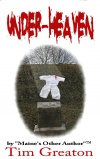
|
About Tim GreatonI live in Maine with my beautiful wife and three amazing children. We share 7-acres with 1 dog, 2 cats, and a population of ducks that varies with the weather. I'm a full-time corporate writer and novelist. My fiction, non-fiction and advertising work has appeared in forums all around the globe. My novels "The Santa Shop,¨ "Under-Heaven," "Zachary Pill, The Dragon at Station End," and "Ancestor Book I" are all available in ebook. "The Santa Shop," and "Under-Heaven ARC...From My Cold Young Fingers" are both available in paperback. "Heroes With Fangs¨ will also be available in the next few months. My brother's publishing company refers to me as "Maine's Other Author TM¨ but I prefer just Tim :-). |
math
In short, NO WAY would a legacy publisher be willing to pay me an advance that rivals the income I'm just now starting to see.
(untitled comment)
The problem is that currently the technology doesn't exist to stop it. If it did, the music industry would not be on its knees, and there's a reason that Hollywood has cut back to half the productions and half the pay levels for major talent. It's because people are turning to streaming and they can no longer sell DVD's at a high level (it used to comprise half of a movie's gross income). That means that movie profits, too, are being chewed up by piracy.
Ultimately, I fear that we have to accept that piracy exists and make as much money as is available in the legal market. And I think the point is that the Big Six can't protect authors from that piracy any more than self-marketing authors can protect themselves.
Let's face it, one third of the entire retail book business just filed bancruptcy and went bye-bye. Big Six can't replace those stores, and even if they did the readers are going digital.
So the question remains, where do authors best fit in the new digital economics? It's my opinion that both can exist, and that the one will force the other to find a better business model. The old model of contracting a hundred authors to two or three books and then waiting for the market to weed them out just doesn't work. Maybe this new system, where the authors vet themselves and then get picked up, like Hocking and Locke, is the solution.
Rest assured, Rob, I understand the concern in all corners of the argument. The problem is that most positions that people are taking do not allow for change as a factor. If change is a tidal wave, then authors are the surfers and the Big Six represents the professional sport sponsors. It seems to me allowing the surfers to surf sponsorless cannot be a bad thing. Those that make it to shore might have a contract waiting, and those that don't can keep paddling as best they can. No harm, no foul.
(untitled comment)
Just a thought.
(untitled comment)
If legacy publishers did, in fact, do substantial promotions as well as guide and grow writers' careers, Mr. Swift's premise of fear might hold more weight. However, the real state of publishing over the last couple of decades (before the ebook revolution) is quite different: an author had to play craps with her time, talent and desired life path, and then in the unlikely case that she landed a contract with the Big Six, she had to either luck into the top 5% of success stories or join the slog of other midlist writers whose prayers rested with an industry that shares only a tiny pittance of profit before ultimately discarding most writers so they can "throw their next author at the wall."
As an indie author who passed the thousand-sale mark a while back, I can only say I'm excited that my crap game is directly between me and whatever audience I can manage to reach. So far I like my odds and my cut a whole lot better than the four years I spent with two hardworking but ultimately unsuccessful New York agents :-)
Techdirt has not posted any stories submitted by Tim Greaton.
Submit a story now.
Tools & Services
TwitterFacebook
RSS
Podcast
Research & Reports
Company
About UsAdvertising Policies
Privacy
Contact
Help & FeedbackMedia Kit
Sponsor/Advertise
Submit a Story
More
Copia InstituteInsider Shop
Support Techdirt